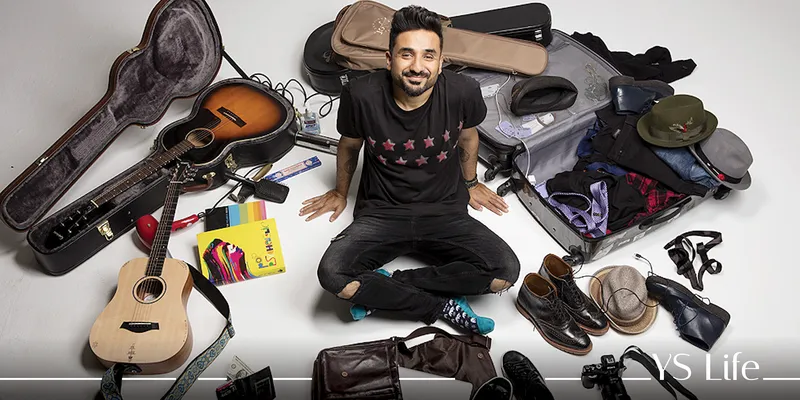Vir Das on his new special ‘Landing’ on Netflix and telling an authentic Indian story
Standup comic Vir Das talks to YS Life on his new Netflix special, ‘Landing’, and being an outsider in three different industries.
Standup comic Vir Das’s new special was released on Netflix. I make a feeble joke on how it’s “landing” on the platform, but the joke doesn’t seem to land.
Landing, the global comedy star tells me, is about “a flight home, the central feeling of what it feels to have a home and be safe.”

Vir Das
“It’s also about what happens when a moron travels the world, a look at childhood, and what it means to be an Indian across the globe and then come home,” Vir tells YS Life.
He goes on to say that though it may sound fancy and artistic, “it’s just a lot of jokes, man, so just watch it.”
The comic is blasé, even self-deprecating, through the interview, and is not certainly keen on looking back. His last special, Vir Das: For India courted controversy and also won an Emmy nomination.
“It may sound like a cliché, but I don’t look back at all. But I do it for purely narcissistic reasons, where I think I improve every year, and I think I get better every year because of the hours I put in,” he says.
He adds that sometimes when he looks back at his old work, he cannot watch it. “The less I have to watch myself in general, the better my life will be. So, for purely vanity and narcissistic reasons, I do not look back, ever.”
Comedy as an art form is going places. According to a BookMyShow report, three of the top ten ticket sales went to comedy shows, and Vir’s Wanted tour was at number two.
So, do people want to laugh?
“To have English stand up there with music clearly shows there’s an appetite for laughter. And, the best part is we outsold IPL tickets. The demand is clearly there. Indians want to spend money to laugh and, with the pandemic abating, I think it goes for any genre of art,” Vir says.
Are his audiences different across India, the US, the UK, and Australia? Vir acknowledges that, with each passing year, valid Indian content is global content, and that’s the bottom line. According to him, it’s important to tell an authentically Indian story, and it will be appreciated by people of any age or nationality.
But, surely, he must agree content has changed with the TikTok and Instagram-influenced generation demanding more.
“If it has, I am the most clueless person and struggling with it. If you look at who’s coming to my shows now, it’s people between the ages of 18 and 25. That’s my largest demographic right now as an artist. To be 43 and try and relate to this generation is a very interesting puzzle to solve, and I haven’t yet,” he admits.
Is he at least getting there? Vir says what he loves about this generation is that it can smell b******t a mile away. “They are like, be real and we will give you the largest base ever. But if you try and b******t us, we will reject you instantly,” he says.
Beyond blurred lines
Comedians in India have paid the price for speaking up. So, is the solution then to practise safe comedy?
Vir believes it’s hard to determine or predict what people are going to be mad at anymore; there’s no such thing as safe comedy, and reactions are so random.
So, can one follow the freedom of expression discourse in times when being cancelled is a possibility, and being woke might be a curse?
“When you perform for over a certain amount of people, you know, you realise that the basis of comedy is kind of various groups that fundamentally may disagree with each other and agreeing to have a laugh at the same time under the same roof, he says.
“And then you find that these very specific streams of black and white or woke—the lines between them are quite blurred. In India, 99% of us want to pay our bills, watch Bigg Boss, and go to bed, right? That's it. We want to feel secure and safe.”
Vir feels that tribalism is very much like a social media thing. And if you are blessed enough to have a large audience, you'll see real people. And if you take the social media glasses off, then, you’ll really see India.
Is comedy in films not as nuanced when it comes to storytelling? For example, take his OTT series Hasmukh versus a Golmaal franchise with crass humour. Vir points out that it amounts to false equivalence.
“There is an audience for every type of comedy. Golmaal will have a very large audience but Hasmukh is designed for a very specific one, which is significantly smaller,” he explains. “What will be better for comedy is at some point we get to a stage where comedy is a separate vertical in a platform or a studio. I look forward to that because then it means people who are experienced in comedy are green-lighting comedy and developing it.”
Vir has played supporting roles in a few Hindi films but is better known as a standup comic. Does he believe that the Indian film industry is still insular when it comes to outsiders?
“I’ve never particularly been an insider in any industry. I am a comedian who works in Bollywood and a Bollywood guy who does standup comedy, and I’m also a comedian who plays at music festivals. So, my perspective is to always be an outsider. I am an outsider working inside three different industries reasonably well,” he says.
Edited by Swetha Kannan






![[YS Exclusive] Athina AI raises $3M in seed funding from Perplexity Co-founder Denis Yarats, Y Combinator, and others](https://images.yourstory.com/cs/2/fe056c90507811eea8de27f99b086345/AthinaAINewsFeatureImage-1731568298124.jpg?mode=crop&crop=faces&ar=1%3A1&format=auto&w=1920&q=75)
